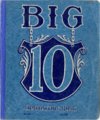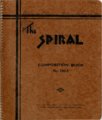Diaries
File — Box: 9, Folder: 1-12
Identifier: V
Scope and Contents
- The notebook diaries of Virginia Blair contain the day-to-day entries of a very lonely and unfulfilled woman, who was never quite successful in realizing her dreams of creative achievement. She was born at 183 Canyon Road, Salt Lake City, Utah, where her early years were spent. She later moved to Logan with her family. As soon as Virginia was old enough to leave home, she went to Hollywood, California, and did freelance work in the movie industry for fourteen years. Some very early diary entries are found on sheets of paper in her notebooks. She started to record consistently in 1934, when she was forty-four years of age. Virginia, living with her mother and brothers (Philip, George, and Millington) in California, has been ill and unable to work. The lack of steady income causes Virginia grief for the rest of her life, as she is barely able to get by, many times not having enough money for food, or a doctor, or for some of the necessities of life. She states that many times she goes to bed hungry.
- The love and close companionship of her mother Nellie Thatcher Blair is her main comfort in life. She also has a great love for dogs, calling them by special names as if they were her dearest friends. The death of the little dog "Sis" causes her great despair. By the beginning of Diary 2 (1942), Virginia's mother has died, leaving her emotionally devastated. At this time she is sharing the home of her brother Millington, "out in the Valley" (California) where she is isolated and without a telephone, washing machine, or any other conveniences. She has to walk on a unpaved road a mile to the nearest grocery store or to any transportation. Her "Philco" is her constant companion and she listens to Lanny Ross sing, to the program "The Voice of Experience," and follows the war news daily, always listening with great admiration to her beloved President Franklin D. Roosevelt give his "Fireside Chats." She has a good relationship with her brother George, but feels very unkindly toward his wife Greta, stating that this marriage "hastened her mother to her grave."
- During World War II she at last finds employment in defense plants, working in Burbank at Timms Aircraft and at other plants--one time rivoting airplane parts working nine to ten hours a day. After the war she is again out of work, still dependent on Millington. He resents the burden of her care, and although at times he is good and kind, he normally is angry and abusive toward her. She states several times that "My life with Millington has been hell on earth."
- Virginia yearns for a place of her own where she can be free to sing, play the piano, write, paint, or dance as she feels, but she lacks the finances. Once she participates on a program "Jack of All Trades," on a local radio station and wins $10.00 and a Parker pen. She writes poetry, stories, and plays and submits them for publication, but is never very successful. She also tries selling greeting cards and tending children.
- The obituaries of important people are noted, especially those in the movie world--Carole Lombard, who was killed in an airplane crash; Wallace Berry; and Theda Bara. She always remembered Berry for his kindness. He would greet her at the studio with "Hello little flower, I could put you in my pocket, just as this rosy apple," and he would take an apple out of his pocket and make funny faces at her. She stated that the death of Theda Bara brought back many memories as she had worked in many of her pictures.
- In 1951 Virginia is called as a home missionary for the LDS church, which gives her a new interest and great comfort as the church is very important to her.
- It grieves her that Millington will not attend to his church duties and this causes animosity between them. She feels that "his spirit is so evil that the spirit of God cannot dwell in this house." She tells of tracting and converting people to her church.
- Short visits are made to relatives in Salt Lake City, Las Vegas, and Logan. One time George and Greta Blair take her to Salt Lake City to attend annual conference and they revisit their old family home at 183 Canyon Road. She also calls on Mrs. Rex Williams on L Street and gives her a blue shawl and a silver comb that belonged to her great-grandmother Mary Ann Angell Young, to be put in the Lion House.
- On March 17, 1955, at 5:22 a.m., at Sherman Oaks, California, she notes seeing a flash of light that lighted up her room. The light was from an atomic bomb detonated in Las Vegas, Nevada, at the testing grounds.
- Sometime in 1957 Virginia and Millington move back to Logan, Utah. Although she must still share Millington's home, Virginia's life is much happier as she visits relatives and friends, goes to the movies, and works in the temple, her ward, and relief society.
- In 1959 Gwen Wilcox, working for the Bee Hive House Restoration, visits Virginia, asking for any things that belonged to Brigham or Mary Ann Angell Young. She feels this would be a good place to put some of her keepsakes.
- In the last diaries, Millington has had a mental breakdown, destroying many of Virginia's personal things and refusing to let her have any of her possessions she has saved so long to get. At last she moves to a place of her own and can use some furniture and other items that have been stored in Logan for years. She prays for her brother's recovery and it saddens her to see him so ill.
- Dreams play a significant part in the life of Virginia Blair. They are very real to her and she records them in vivid detail, noting that she always dreams in color. They are so clear that she draws pictures, illustrating them. Her frame of mind is influenced by them, sometimes for days. It was made known to her in a dream that she would die in April.
- All her life Virginia loved to write. Her poetry is evident in every diary, as she composes verse for many occasions. The notebook diaries provide an outlet for her personal experiences, frustrations, and feelings about life. She suffers deep disappointment that she was never given the opportunity to develop the many "God given talents" with which she was blessed.
Dates
- Creation: 1836-1968
Creator
- From the Collection: Blair, Philip, 1896-1975 (Compiler, Person)
Conditions Governing Access
Twenty-four hour advanced notice encouraged. Materials must be used on-site. Access to parts of this collection may be restricted under provisions of state or federal law.
Some original items have been removed and placed in Reserve. Access must be given by the Manuscripts Curator and by appointment. An archivist must remain with the items if being used. Photocopies are available in the collection for research use.
Extent
From the Collection: 4.5 Linear Feet (12 boxes)
Language of Materials
From the Collection: English
- Virginia Blair diary, 1931-1937
- Virginia Blair diary, 1942
- Virginia Blair diary, 1942-1945
- Virginia Blair diary, 1945-1948
- Virginia Blair diary, 1947-1949
- Virginia Blair diary, 1949-1950
- Virginia Blair diary, 1951-1952
- Virginia Blair diary, 1952-1954
- Virginia Blair diary, 1954-1955
- Virginia Blair diary, 1955-1957
- Virginia Blair diary, 1959 - 1961
- Virginia Blair diary, 1961
Repository Details
Part of the J. Willard Marriott Library Special Collections Repository
Contact:
295 South 1500 East
Salt Lake City Utah 84112 United States
801-581-8863
special@library.utah.edu
295 South 1500 East
Salt Lake City Utah 84112 United States
801-581-8863
special@library.utah.edu












